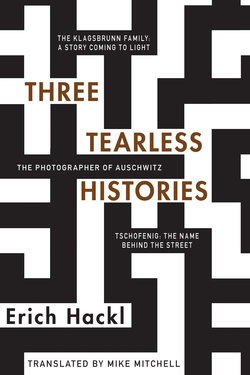Читать книгу Three Tearless Histories - Erich Hackl - Страница 7
На сайте Литреса книга снята с продажи.
Оглавление2
I FIRST MET LEO’S GRANDSON two and a half years ago in Rio de Janeiro. The Universidade Federal Fluminese, the campus of which is in Niterói, on the other side of the bay, had invited me to give a number of lectures and after the first few days in Rio I was somewhat surprised that the inhabitants did not at all conform to the image that is generally ascribed to them: I found them neither particularly cheerful nor loquacious or bubbling over with vivacity. Until I got to know Victor Hugo Klagsbrunn that is. He was warm-hearted in a way that was almost incidental, assured, imaginative and blithely unconcerned about time. But—with one exception: for my final lecture we arrived in Niterói an hour and a half late—things always worked out at the last minute. An authentic carioca, then, surrounded by unauthentic, depressed and harassed seeming citizens of Rio, even though, or because, Victor’s father came from Vienna, his mother from Berlin and he’d spent almost sixteen years in exile. He invited me to his home, a spacious, luxuriously furnished apartment in Copacabana, where I met his wife, Marta, who had been together with him in exile, and a barking white ball of wool that answered to the name of Tuca.
There, in the Rua Ministro Viveiros de Castro, Victor keeps something which I think gives him the most pleasure of all his family heirlooms: a poster of the Floridsdorfer Athletiksport-Club announcing two matches in the Austrian soccer championship being played at the Hohe Warte stadium on the same day, Sunday 11 September: FAC against Wacker and Vienna against WAC. As Victor discovered, the poster is from 1932 and has, among many others, adverts for his grandfather’s coal business, Karl Jizda’s sports equipment shop and the Sinai Clothing Store. Karl Jizda was a legendary center-forward for the FAC, Leo Klagsbrunn its president and the Sinai Clothing Store was on the first floor of Am Spitz 2 where the club also had its premises. We will come across that store again under the misleading and disrespectful designation of furniture shack. And the match didn’t take place on the Sunday but on the Saturday, as Victor’s grandfather wrote on the poster in blue pencil, and FAC beat Wacker Wien 3-2, with goals from Pepi Stroh (2) and Gustl Jordan.
There was only a little Victor could tell me about the history of his forebears, for the early death of his father and his own circumstances had prevented him from familiarizing himself with them. On the other hand he did present me with a pile of documents. Most came from the estate of his Uncle Kurt, others he’d had someone dig out of the Austrian State Archives for him. And he told me his own story, and Marta hers, the story of their life together. A story of persecution, worse than that of his parents and grandparents. I will relate both of them, the way I heard and remembered them, the way Victor and I investigated them in Vienna two months later, and the way we have reconstructed them since then in a question-and-answer carousel between here and there: the basic data, rather sparse, not very vivid, without feelings, which our imagination has to supply.
